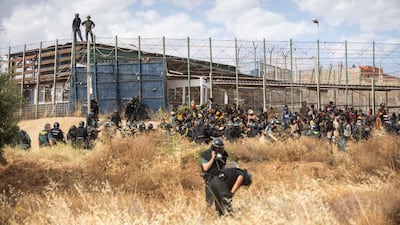The death toll following a mass attempt by a crowd of African migrants to cross from Morocco into Spain's Melilla enclave climbed to 18 on Friday, Moroccan authorities reported.
About 2,000 migrants had approached Melilla at dawn and more than 500 had managed to enter a border control area after cutting through a fence with shears, the Spanish government's local delegation said in a statement.
Moroccan officials said late on Friday that 13 migrants had died of injuries sustained in the incursion, in addition to five who were confirmed dead earlier in the day.
“Some fell from the top of the barrier” separating the two sides, a Moroccan official said and added that 140 security personnel and 76 migrants were injured during the attempt to cross.
It was the first such mass incursion since Spain and Morocco mended diplomatic relations last month.
The Spanish government's local delegation said only that 49 Spanish police officers had been lightly injured.
Morocco had deployed a “large” number of forces to try to repel the assault on the border, who “co-operated actively” with Spain's security forces, it said earlier in a statement.
Images on Spanish media showed exhausted migrants lying on the pavement in Melilla, some with bloodied hands and torn clothes.
Speaking in Brussels, Spanish Prime Minister Pedro Sanchez condemned the “violent assault” which he blamed on “mafias who traffic in human beings”.
Melilla and Ceuta, Spain's other tiny North African enclave, have the European Union's only land borders with Africa, making them a magnet for migrants.
On Thursday night, migrants and security forces “clashed” on the Moroccan side of the border, Omar Naji of Moroccan rights group AMDH said. Several of them were taken to hospital in Nador, he added.
In March this year, Spain ended a year-long diplomatic crisis by backing Morocco's autonomy plan for Western Sahara, going back on its decades-long stance of neutrality.

Mr Sanchez then visited Rabat, where the two governments hailed a “new stage” in relations.
The row began when Madrid allowed Brahim Ghali, leader of Western Sahara's pro-independence Polisario Front, to be treated for Covid-19 in a Spanish hospital in April 2021.
A month later, about 10,000 migrants surged across the Moroccan border into Spain's Ceuta enclave as border guards looked the other way, in what was widely seen as a punitive gesture by Rabat.
Rabat has called for Western Sahara to have an autonomous status under Moroccan sovereignty but the Polisario wants a UN-supervised referendum on self-determination as agreed to in a 1991 ceasefire agreement.
In the days before Morocco and Spain patched up their ties, there were several attempted mass crossings of migrants into Melilla, including one involving 2,500 people, the largest such attempt on record. About 500 made it across.
Patching up relations with Morocco — the departure point for many migrants — has led to a drop in arrivals, notably in Spain's Atlantic Canary Islands.
Over the years, thousands of migrants have attempted to cross the 12-kilometre border between Melilla and Morocco, or Ceuta's eight-kilometre border, by climbing fences, swimming along the coast or hiding in vehicles.
The two territories are protected by fences fortified with barbed wire, video cameras and watchtowers.
Migrants sometimes use hooks and sticks to try to climb the border fence and throw stones at police.











